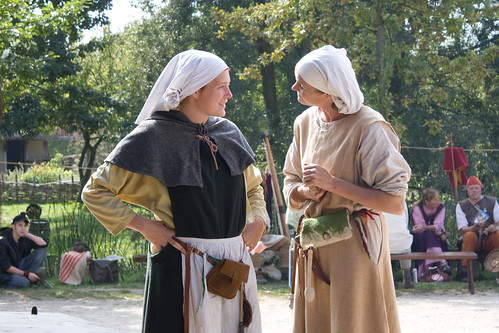
I've been having a rough time trying to decide how to write realistic, believable dialogue for the characters of my "medieval" fantasy book (www.BeastAndBeauty.com). I wonder if I should make their language archaic and flowery, or more palatable to the modern ear. I don't want to sound pedantic, but am afraid that if the words coming out of my characters' mouths are too modern, it will seem anachronistic. I'm not sure that I'm capable of writing absolutely "authentic" dialogue, anyway!
For example, how do I get the point across in this passage of dialogue, staying true to the setting but also using vocabulary that is readable?
“Cessy, are you happy here?”
“I think so.”
“You don’t sound very sure.”
“Perhaps it’s because I’m not really sure what happiness is. Is it adventure? Is it greatness? Is it meaning? Is it love? Is it contentment? Is it wonder? Is it skill? Is it a little bit of everything? How can I tell if I’m happy if I hardly know the meaning of the word?”
Alis gave a low, husky laugh. “I’m afraid that there isn’t a set definition, dearie. It’s different for everyone. I was happy with your father, happier than I had any right to be, but he would have driven another woman half mad with all his quirks and follies. That was my happiness—my home, my friends, my daughter. Your happiness may be very different indeed.”
I asked a fellow authoress her opinion of my predicament. Betsy St. Amant from the Scribble Chicks blog says this:
This is a tough one. The same rule sort of applies here as to dialect, such as someone who speaks with a strong southern accent, or any accent, etc. You don't want the dialect to be so strong and in every sentence so the reader gets frustrated and puts the book down. The way experts advise handling that is to introduce that character with a slightly strong first sentence. Then the next scene, tone it down to maybe two or three dialect words. Then from then on, only one per scene or so. Enough to remind the reader of their accent so they can "hear it" without bombarding them with it to the point of having to wade through dialogue.
Your question is similiar though not identical. Could the same rule somehow apply to your situation? Maybe start a little archaic and flowery, and immeidately tone it down and keep it subtle as the novel progresses? If you set it up the way you want it, then you can trust your reader to continue to "hear it" and understand as they go.
This is probably going to be a trial and error type of situation. I'd recommend trying what I suggested and having a reader or friend give you their honest opinion as to how it flows.Also, think about what YOU like - because you're a reader too. When you read a medieval fantasy novel, do you like reading poetic dialogue that might take you longer to comprehend but is true to the times? Or would you rather get on with the story?
What fantastic advice! I'll try my best to implement it.
What is your opinion of this dilemma?
women talk, a photo by hans s on Flickr.
2 comments:
I have many of the same problems with the story I am currently working on. However, I write my characters the way I talk, but I am a bit of an anachronism myself with it comes to dialogue even with normal human beings. What I do is write out my dialogue and leave it to sit. Then, when everything is finished, I give it a good going over. If soemthing seems out of place in the conversation, I change it then. But I don't worry about it mid-conversation, because it stops the idea-flow.
Very good points! I'm becoming more of a fan of the "don't stop in the middle" school of writing. I'm learning, slowly but surely!
Post a Comment